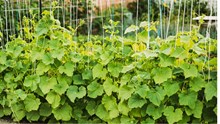
To get a good yield, whether it is vegetables, herbs, or fruits, a good seven to nine hours of sunlight with enough water supplies is necessary. For crops to thrive, soil temperature should be over 21 degrees Celsius.
Almost all vegetable plants need a pH of 7 and 5 percent or higher organic material in the soil to grow. However, with the summers approaching the most crucial factor determining a good yield from your plants is water. Now you must be wondering, how much and how often should you water your plants? Don’t worry we have curated a complete guide about watering vegetables, fruits & herbs plants in summers. Read on.
Summer Watering guide for Vegetables:
Water your vegetables plants at least 3 times a week. They absorb more water in summer to produce the crops properly. The amount of water needed in summer to water the plants can be a difficult task so use these methods of watering plants.
Rotor systems in irrigation
Rotor systems are more efficient at watering than spray heads as they pour water at a significantly slower speed than sprinklers which helps the soil to absorb the moisture better.
Drip Irrigation
- Drip irrigation applies water directly to the root layer of the soil. Since there is no treatment between the rows, it leads to fewer weeds in the garden and saves water.
- Field tasks like harvesting can be continued throughout summer since the region between the rows stays dry.
- Fertilizers can be spread effectively using the drip technique as well.
Summer watering guide for flowers
Check the soil moisture by digging your finger a few inches deep in the oil. You can also use a soil moisture meter for this purpose. The water needs to reach the roots of the flowering plants as they are sensitive to weather and soil conditions and require extra care to thrive. The best time to water flowering plants in summer is before 8 in the AM. Around this time, as the weather is still cool, the roots can effectively absorb the water without it evaporating. It is to be noted that if the soil gets dry before nighttime, your plant might need to be watered more than once. Flowers require a stable supply of water to thrive and leaving them until they dry out can cause them to lose flowers.
Mulching
Start mulching as soon as the soil starts heating up in the summers. Summer mulching has its benefits including softening the soil, preventing weed growth, and keeping the soil hydrated. Mulch dissolves into the vegetation as time goes by and flows into the soil to be fed by the rot systems.
One way to make sure your flowering plant is not dried out or over waters, as they both can lead to the death of the flower, try using a soaker hose to properly water your plants.
Soaker hoses reduce the burden of you carrying a huge water container to the flowers to water them. They maintain a consistent water supply on the earth’s surface making sure that the plant’s leaves stay dry.
Summer watering guide for Herbs
Herbs are a great and easy way to make your diet healthier, not to mention they make your food tastier! Herbs don’t require much space to grow and are also super easy to grow. For herbs to thrive, summers are the best time to plant them.
Herbs have a different water requirement than a flower. They do not like standing water and moist soil. Water your herbs in the morning when the soil feels extremely dry for it to grow well.
If you are growing herbs in your garden or backyard, use only 500-800 ml of water for every plant each week.
Make sure your herbs are kept on the windowsill or balcony area. These indoor herbs should be watered once a day, less than outdoor herbs. However, ensure your indoor herbs are in pots with drilled holes on the bottom to keep excess water away from the roots.
















